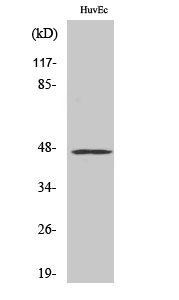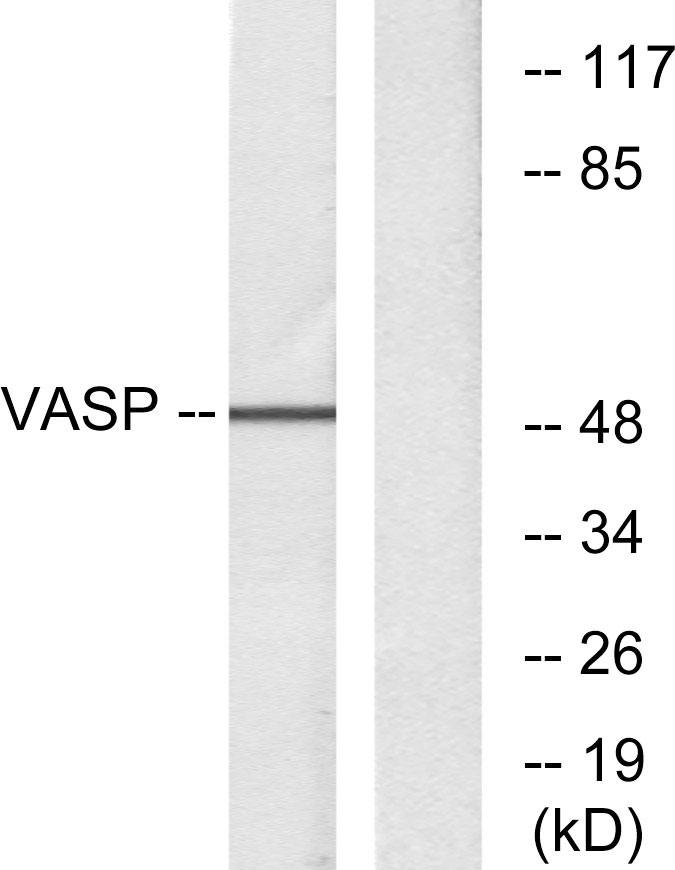

| WB | 1/500-1/1000 | Human,Mouse,Rat |
| IF | 咨询技术 | Human,Mouse,Rat |
| IHC | 1/50-1/100 | Human,Mouse,Rat |
| ICC | 1/50-1/200 | Human,Mouse,Rat |
| FCM | 咨询技术 | Human,Mouse,Rat |
| Elisa | 1/10000 | Human,Mouse,Rat |
| Aliases | Vasodilator-stimulated phosphoprotein |
| Entrez GeneID | 7408 |
| WB Predicted band size | Calculated MW: 40 kDa; Observed MW: 46,50 kDa |
| Host/Isotype | Rabbit IgG |
| Antibody Type | Primary antibody |
| Storage | Store at 4°C short term. Aliquot and store at -20°C long term. Avoid freeze/thaw cycles. |
| Species Reactivity | Human,Mouse,Rat,Monkey |
| Immunogen | The antiserum was produced against synthesized peptide derived from human VASP. AA range:124-173 |
| Formulation | Purified antibody in PBS with 0.05% sodium azide,0.5%BSA and 50% glycerol. |
+ +
以下是3篇与VASP抗体相关的文献概览,涵盖其在不同研究中的应用:
1. **文献名称**:*"VASP phosphorylation analysis as a biomarker of platelet reactivity in patients on P2Y12 inhibitors"*
**作者**:Schwarz, U. R., et al.
**摘要**:该研究利用针对磷酸化VASP(Ser157/Ser239)的特异性单克隆抗体,通过流式细胞术评估血小板对P2Y12受体抑制剂的反应性,为抗血小板治疗监测提供了方法学依据。
2. **文献名称**:*"Profilin and VASP interactions in cell adhesion and migration"*
**作者**:Harbeck, B., et al.
**摘要**:研究通过免疫共沉淀和免疫荧光技术(使用VASP抗体),揭示了VASP与Profilin蛋白在细胞黏附和迁移中的协同作用,强调了其在细胞骨架重组中的关键功能。
3. **文献名称**:*"Vasodilator-stimulated phosphoprotein (VASP) regulates actin polymerization in metastatic cancer cells"*
**作者**:Lambrechts, A., et al.
**摘要**:通过Western blot和免疫组化(基于VASP抗体),发现VASP在癌细胞中高表达并促进侵袭性伪足形成,提示其作为癌症转移的潜在标志物。
这些文献展示了VASP抗体在血小板功能分析、细胞骨架机制研究和肿瘤生物学中的多样化应用。
The vasodilator-stimulated phosphoprotein (VASP) is a key regulatory protein involved in actin cytoskeleton dynamics, cell motility, and adhesion. It belongs to the Ena/VASP family and is phosphorylated at specific serine residues (Ser157. Ser239. Thr278) in response to cyclic nucleotide-dependent signaling pathways (cAMP/cGMP). This phosphorylation modulates VASP's ability to interact with actin filaments and focal adhesion complexes, influencing cellular processes such as platelet aggregation, endothelial barrier function, and cell migration.
VASP-specific antibodies are essential tools in biomedical research for detecting and quantifying VASP expression, phosphorylation status, and subcellular localization. They are widely used in techniques like Western blotting, immunofluorescence, and flow cytometry to study VASP's role in physiological and pathological contexts, including cardiovascular diseases, cancer metastasis, and immune responses. For instance, reduced VASP phosphorylation is linked to impaired vasodilation in hypertension, while its overexpression in cancer cells correlates with enhanced invasiveness.
These antibodies also aid in evaluating drug efficacy, particularly compounds targeting cAMP/cGMP pathways (e.g., nitric oxide donors or phosphodiesterase inhibitors). By enabling precise analysis of VASP's functional states, they contribute to understanding cell signaling mechanisms and developing therapeutic strategies for thrombosis, inflammation, and vascular disorders.
×